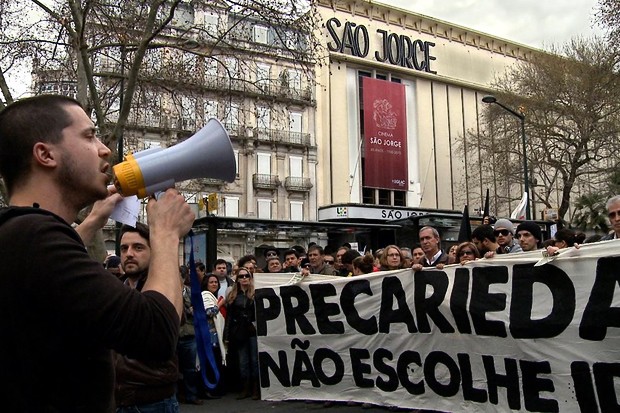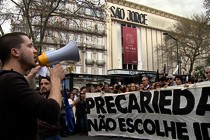Review: Dreamocracy
by Vitor Pinto
- Raquel Freire and Valérie Mitteaux’s documentary reconciles activism and idealism in a social portrait of a country in crisis

In 2011, after being inspired by the Arab Spring, a group of activists began a protest against job insecurity and low salaries, which saw half a million people take to the streets of Portugal. This was a country coming out of the closet in order to demand a greater degree of dignity and a change in policies that would once again place people, and not money, at the centre of the decision-making process. From 2011 to this very day, nothing has changed, or perhaps the situation has got even worse. The country was bailed out/crippled by the troika, emigration and unemployment among young people reached unprecedented heights, and job insecurity virtually became an inseparable part of everyone’s lives. But there will always be those who fight back in the face of adversity, and Dreamocracy [+see also:
trailer
film profile] – which had its premiere last night at the Porto/Post/Doc Festival – is a portrait of that conscious, spirited and idealistic resistance. Because in order to save democracy, it is perhaps not enough to fight: you have to dream as well.
The lens of Portuguese director Raquel Freire and French filmmaker Valérie Mitteaux has spent several years following João and Pedro, a couple of idealists who launched the 12 March movement. They both belong to a kind of precarious elite, a type of person that has spread like wildfire throughout Portuguese society over the last few years. They are “elite” because they are both well-bred and cultured graduates, and “precarious” because they are unemployed or get by on freelance work, aided by the solidarity shown by their families and friends. Spurred on by what seems to be some sort of awakening of a greater social awareness, the two men have come up with a plan: to create a “citizens’ academy” that will train activists and will serve as a think tank for alternative policies.
Dreamocracy centres on the birth of this project, which is still taking shape. By focusing on this initiative, the film outlines a certain side of modern-day activism (complete with its Skype meetings, an unavoidable virtual element that would ideally be made into a reality), and also depicts another, non-activism-related, aspect of a society crippled by bills to pay, which does not know, or has already forgotten, what it means to show political commitment.
With its observational style, the documentary captures meetings, conversations in cafés, the preparations for protests, the gaping chasm that exists between the optimistic speech made by former commissioner Viviane Reding and the harsh social reality, and the efforts to achieve some sort of synergy with other alternative projects, among other assorted snippets of João and Pedro’s lives during their years-long struggle. Raquel Freire, who is an activist herself, appears in various scenes in the film, thus making it clear right from the very first shots, filmed on a beach, that her position as a filmmaker will be neither neutral nor distant, but rather in perfect personal and political harmony with the stances and plans of her two protagonists.
Co-produced by Ukbar Filmes and Cinétévé, Dreamocracy received backing from France Télévisions, the FCGulbenkian and Lisbon City Council.
(Translated from Spanish)
Did you enjoy reading this article? Please subscribe to our newsletter to receive more stories like this directly in your inbox.

















